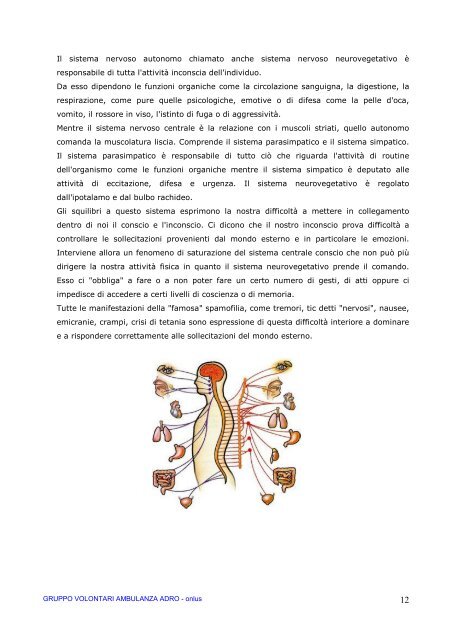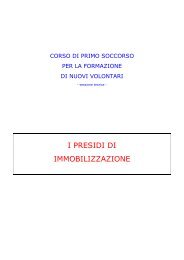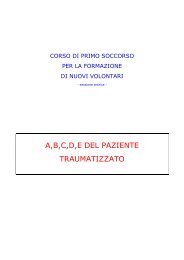Il corpo umano: il sistema nervoso - Gruppo Volontari Ambulanza di ...
Il corpo umano: il sistema nervoso - Gruppo Volontari Ambulanza di ...
Il corpo umano: il sistema nervoso - Gruppo Volontari Ambulanza di ...
You also want an ePaper? Increase the reach of your titles
YUMPU automatically turns print PDFs into web optimized ePapers that Google loves.
<strong>Il</strong> <strong>sistema</strong> <strong>nervoso</strong> autonomo chiamato anche <strong>sistema</strong> <strong>nervoso</strong> neurovegetativo è<br />
responsab<strong>il</strong>e <strong>di</strong> tutta l'attività inconscia dell'in<strong>di</strong>viduo.<br />
Da esso <strong>di</strong>pendono le funzioni organiche come la circolazione sanguigna, la <strong>di</strong>gestione, la<br />
respirazione, come pure quelle psicologiche, emotive o <strong>di</strong> <strong>di</strong>fesa come la pelle d'oca,<br />
vomito, <strong>il</strong> rossore in viso, l'istinto <strong>di</strong> fuga o <strong>di</strong> aggressività.<br />
Mentre <strong>il</strong> <strong>sistema</strong> <strong>nervoso</strong> centrale è la relazione con i muscoli striati, quello autonomo<br />
comanda la muscolatura liscia. Comprende <strong>il</strong> <strong>sistema</strong> parasimpatico e <strong>il</strong> <strong>sistema</strong> simpatico.<br />
<strong>Il</strong> <strong>sistema</strong> parasimpatico è responsab<strong>il</strong>e <strong>di</strong> tutto ciò che riguarda l'attività <strong>di</strong> routine<br />
dell'organismo come le funzioni organiche mentre <strong>il</strong> <strong>sistema</strong> simpatico è deputato alle<br />
attività <strong>di</strong> eccitazione, <strong>di</strong>fesa e urgenza. <strong>Il</strong> <strong>sistema</strong> neurovegetativo è regolato<br />
dall'ipotalamo e dal bulbo rachideo.<br />
Gli squ<strong>il</strong>ibri a questo <strong>sistema</strong> esprimono la nostra <strong>di</strong>fficoltà a mettere in collegamento<br />
dentro <strong>di</strong> noi <strong>il</strong> conscio e l'inconscio. Ci <strong>di</strong>cono che <strong>il</strong> nostro inconscio prova <strong>di</strong>fficoltà a<br />
controllare le sollecitazioni provenienti dal mondo esterno e in particolare le emozioni.<br />
Interviene allora un fenomeno <strong>di</strong> saturazione del <strong>sistema</strong> centrale conscio che non può più<br />
<strong>di</strong>rigere la nostra attività fisica in quanto <strong>il</strong> <strong>sistema</strong> neurovegetativo prende <strong>il</strong> comando.<br />
Esso ci "obbliga" a fare o a non poter fare un certo numero <strong>di</strong> gesti, <strong>di</strong> atti oppure ci<br />
impe<strong>di</strong>sce <strong>di</strong> accedere a certi livelli <strong>di</strong> coscienza o <strong>di</strong> memoria.<br />
Tutte le manifestazioni della "famosa" spamof<strong>il</strong>ia, come tremori, tic detti "nervosi", nausee,<br />
emicranie, crampi, crisi <strong>di</strong> tetania sono espressione <strong>di</strong> questa <strong>di</strong>fficoltà interiore a dominare<br />
e a rispondere correttamente alle sollecitazioni del mondo esterno.<br />
GRUPPO VOLONTARI AMBULANZA ADRO - onlus<br />
12




